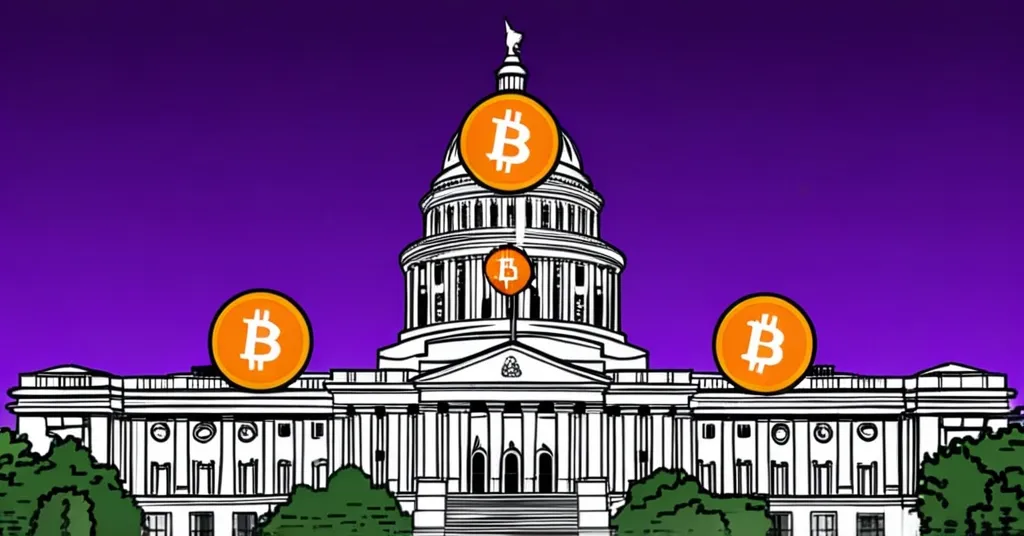Texas Senate Debates Bitcoin for State Reserves, Joins Georgia and Wisconsin

Texas Senate Considers Bitcoin for State Reserves Amid Growing National Interest
The Texas Senate is set to discuss a bold financial strategy: incorporating Bitcoin into the state’s reserves. Republican Senator Charles Schwertner’s proposal aims to diversify state funds by investing in digital assets, signaling a shift in how governments view cryptocurrencies as strategic assets.
- Texas Senate to debate Bitcoin in state reserves.
- Senator Charles Schwertner spearheads the initiative.
- Only Bitcoin currently meets the bill’s market cap criteria.
- Georgia and Wisconsin also exploring Bitcoin investments.
- Federal evaluation led by David Sacks, the “Crypto Czar.”
Under Schwertner’s proposal, the Texas state comptroller would be permitted to invest in digital assets with a market capitalization exceeding $500 billion. Today, only Bitcoin meets this criterion, highlighting the state’s interest in high-value, established digital currencies. Schwertner praised Bitcoin as the “best-performing asset of the last ten years” during the hearing, underscoring skepticism towards traditional fiat currencies.
Market capitalization refers to the total value of all coins in circulation, and state reserves are funds the state holds as a financial safety net. Imagine Bitcoin as the “digital gold” in these reserves, a hedge against the devaluation of traditional money.
Georgia is also jumping on the Bitcoin bandwagon with Senate Bill 178, introduced on February 13, 2025, by Republican Senators Greg Dolezal, Brandon Beach, and Clint Dixon. This bill would empower the state treasurer to invest up to 5% of state funds in Bitcoin, ensuring provisions for safe handling and potential loaning of these assets. Across state lines, Wisconsin has been dabbling in Bitcoin-related financial products, showing that the interest in cryptocurrencies is not just a Texas-sized phenomenon.
At the federal level, David Sacks, appointed as the Trump administration’s “Crypto Czar,” is leading a working group to assess the feasibility of a federal Bitcoin reserve. During a press conference on February 4, 2025, Sacks stated, “One of the things that the President instructed us to do was to evaluate the idea for a Bitcoin reserve.” He added, “So that is one of the first things we’re going to look at as part of the internal working group of the administration.” However, the group’s progress hinges on the confirmation of some cabinet secretaries.
“But that’s one of the first things we’re going to look at, is the feasibility of a Bitcoin reserve. I think the concept of the sovereign wealth fund is a little separate.” – David Sacks
While Bitcoin’s integration into state and federal reserves sparks optimism, it’s not without its critics. Some argue that the crypto market’s volatility could expose taxpayers to significant risks. Bitcoin’s roller coaster ride is no secret, and integrating it into reserves is like betting on a high-stakes game. However, proponents like Schwertner and Sacks see it as an opportunity to diversify and innovate. They argue that Bitcoin’s decentralized nature—meaning it’s not controlled by any single entity or government—alongside its proven track record, makes it a unique asset worth exploring.
As these initiatives unfold, the conversation around Bitcoin’s role in financial reserves is only beginning. Whether this leads to a new era of state and federal investment in cryptocurrencies or remains a bold experiment, the crypto landscape’s evolution continues to captivate. Bitcoin’s potential to play a significant role in the future of finance is undeniable, but so are the challenges and risks involved.
Key Takeaways and Questions:
- What is the purpose of the Texas Senate’s public hearing?
The purpose is to discuss a proposal to diversify the state’s financial reserves by incorporating Bitcoin, reflecting a growing interest in alternative assets.
- Who is leading the Bitcoin reserve initiative in Texas?
Republican Senator Charles Schwertner is leading the initiative, emphasizing Bitcoin’s performance as a reason for its inclusion in state reserves.
- What criteria must a digital asset meet to be considered for investment by the Texas state comptroller?
The digital asset must have a market capitalization exceeding $500 billion, a threshold currently met only by Bitcoin.
- What is Georgia’s approach to Bitcoin investment?
Georgia is considering Senate Bill 178, which would allow the state treasurer to invest up to 5% of state funds in Bitcoin, with provisions for safe handling and potential loaning of the assets.
- What is the role of David Sacks in the Trump administration?
David Sacks has been appointed as the “Crypto Czar” and is leading an evaluation of the feasibility of a federal Bitcoin reserve, indicating a specialized focus on digital assets.
- What is the current status of the federal working group on Bitcoin reserves?
The working group is in its early stages, awaiting confirmation of some cabinet secretaries, which may delay the evaluation process.



